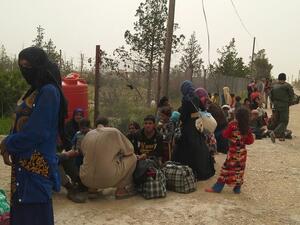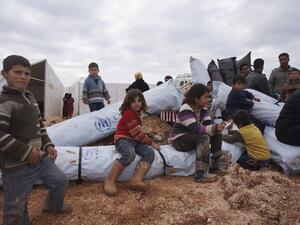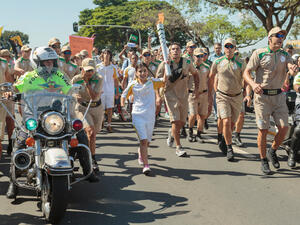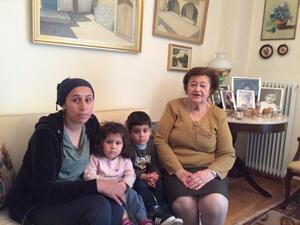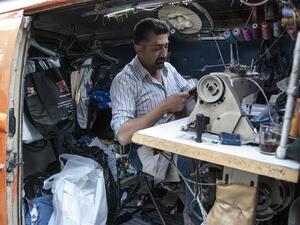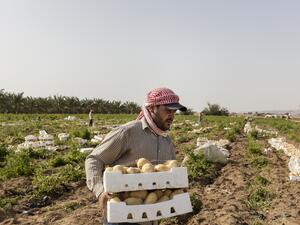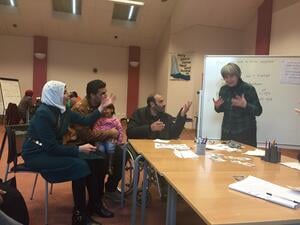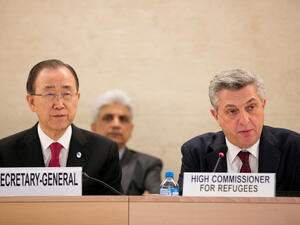UNHCR scaling up relief operation for displaced inside Syria
UNHCR scaling up relief operation for displaced inside Syria

Syrian refugees queue for relief items earlier this week at Jordan's Za'atri camp.
GENEVA, September 7 (UNHCR) - The UN refugee agency said in Geneva on Friday that it is scaling up its emergency response for tens of thousands of forcibly displaced people inside Syria.
UNHCR's share of the budget in a revised Syria Humanitarian Response Plan being presented to donors this morning is more than doubling to US$41.7 million, spokesman Adrian Edwards told journalists.
"The help we are seeking includes for household items, financial assistance for 200,000 people considered vulnerable, medical assistance, counselling of displaced populations, rehabilitation of shelters and support to encourage refugee and displaced Syrian children to return to school."
In the past two weeks, UNHCR teams have visited 29 communal shelters in nine neighbourhoods of Damascus and rural Damascus. "During these visits our teams delivered hygiene items, mattresses and blankets and carried out counselling," Edwards said. This week, UNHCR participated in an inter-agency mission to Homs. The Syrian Arab Red Crescent will deliver household items to vulnerable families in Homs in the coming week.
Edwards also noted that in addition to the tens of thousands of calls received on UNHCR hotlines since July, thousands of refugees have approached the agency's office in Damascus. Last week, close to 3,000 refugees went to the UNHCR office with concerns about security, financial difficulties and need for resettlement. Resettlement activities are continuing, albeit at a slow pace.
With the academic year due to start in mid-September, the relocation of people living in schools is urgent. This week, UNHCR helped 200 Somali and Sudanese refugees relocate to one of the alternative sites identified by the authorities. Many of the buildings identified as alternative communal shelters need work done before people can be relocated.
The needs in neighbouring countries are also great. In Iraq over the past week, 4,165 Syrian refugees entered Kurdistan in Iraq, joining the 14,410 Syrian Kurds already seeking refuge in the region. Some 1,100 of these arrived yesterday - a record for daily arrivals. A total 22,847 Syrians have fled to Iraq since the conflict began. The Al Qaem border point is still closed. The borders at Al Waleed and Rabhia remain open.
UNHCR has been informed that the Iraqi government is planning to provide resident cards, valid for six months, for Syrian refugees at Al Qaem. "This welcome move will enhance refugee protection by giving easier access to services and, we hope, more freedom of movement," Edwards said.
In Jordan, the pace of arrivals from the Syrian border to Za'atri camp has dropped over recent days, with refugees having trouble crossing the border. Some of the 243 people who crossed on Thursday reported bombardment on the Syrian side and limited access to escape routes.
In Za'atri, community kitchens are being built so that refugees can cook their own food, Edwards said, adding: "We are also setting up a mobile phone charging community tent to be run by a refugee committee." This will enable refugees to keep in touch with their families and check on property and the situation at home.
There are now 26,664 people in Za'atri camp. "As thousands more refugees are expected to arrive we are exploring the possibilities of new camps in Jordan and looking at alternative sites," Edwards said. Across Jordan, 81,000 people have been registered or sought registration with UNHCR.
Meanwhile, UNHCR is planning to open a new registration centre in the south of Lebanon, in response to an increasing number of Syrians displaced by conflict who are settling in the area. "We are currently completing a needs assessment and expect to register at least 7,000 people in the south," Edwards said. This group will add to the more than 65,000 Syrians who have come forward to be registered in Lebanon.
Some 79 per cent of the Syrian refugees in Lebanon are women and children and many are vulnerable with special needs, including a large number of children (some 11,000). UNHCR and its partners have been on a back to school drive in recent weeks.
Shelter remains the most urgent issue for an increasing number of refugees in Lebanon, especially in the Bekaa Valley. With the school year about to start, more families are being evicted from schools in the east. UNHCR is offering cash-for-rent to vulnerable families. It is expected that more and more families will take this option in the future, considering the scarcity of collective shelter options.
Meanwhile, registration is picking up in the north of Lebanon with the improvement in the security situation. Some 2,400 people were registered in the last week, 1,000 more than the previous week. An increasing number of refugees arriving in the north are reporting difficulty fleeing to safety. Several families reported being shot at while crossing the border into Wadi Khaled with an 11-year-old girl killed in the process.
In Turkey, there has been a slight decline in the number of Syrians residing in camps and schools, with the return to Syria of some 2,750 people in the past week. Authorities put the total number of refugees at about 78,500 people staying in 11 camps, schools and a transit centre in the southern provinces.
At the same time, there are more than 10,000 people at the borders of Kilis and Hatay waiting to be admitted to Turkey. They are receiving food, water and medicine and authorities assure UNHCR the refugees are being admitted in smaller groups and transferred to camps as space is available. Meanwhile, work continues on the additional three camps: Cevdetiye in Osmaniye, due to open on Sunday, Nizip in Gaziantep due to open on Monday, and Adiyaman due to open on September 20. When all camps are complete, Turkey will have the capacity to host 130,000 people.
Meanwhile, Edwards said UNHCR was concerned to hear reports of the deaths at sea of some 60 people, believed to be Syrians, Iraqis and Palestinians, after a boat sank off the western coast of Turkey near Ismir.

